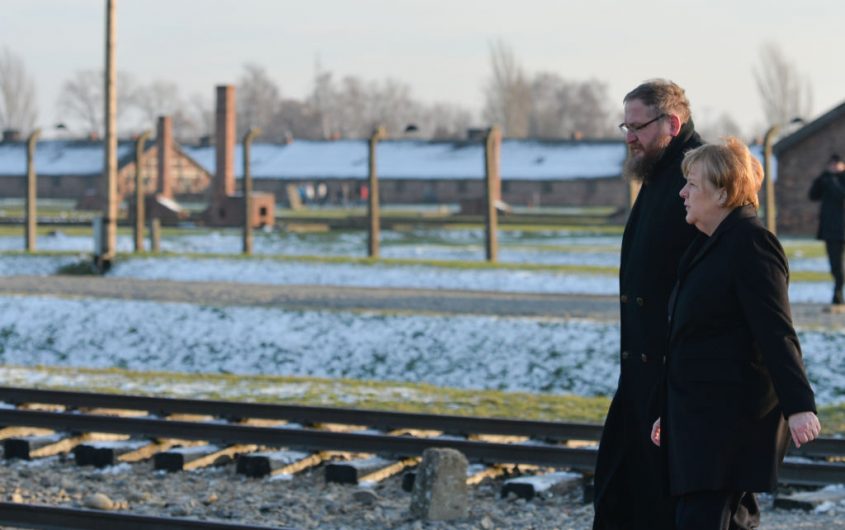
Photo by Artur Widak/NurPhoto via Getty Images
The Federal Republic’s Political and Societal Responses to Auschwitz

Lily Gardner Feldman
Senior Fellow
Dr. Lily Gardner Feldman is a Senior Fellow at AICGS. She previously served as the Harry & Helen Gray Senior Fellow at AICGS and directed the Institute’s Society, Culture & Politics Program. She has a PhD in Political Science from MIT.
From 1978 until 1991, Dr. Gardner Feldman was a professor of political science (tenured) at Tufts University in Boston. She was also a Research Associate at Harvard University’s Center for European Studies, where she chaired the German Study Group and edited German Politics and Society; and a Research Fellow at Harvard University’s Center for International Affairs, where she chaired the Seminar on the European Community and undertook research in the University Consortium for Research on North America. From 1990 until 1995, Dr. Gardner Feldman was the first Research Director of AICGS and its Co-director in 1995. From 1995 until 1999, she was a Senior Scholar in Residence at the BMW Center for German and European Studies at Georgetown University. She returned to Johns Hopkins University in 1999.
Dr. Gardner Feldman has published widely in the U.S. and Europe on German foreign policy, German-Jewish relations, international reconciliation, non-state entities as foreign policy players, and the EU as an international actor. Her latest publications are: Germany’s Foreign Policy of Reconciliation: From Enmity to Amity, 2014; “Die Bedeutung zivilgesellschaftlicher und staatlicher Institutionen: Zur Vielfalt und Komplexität von Versöhnung,” in Corine Defrance and Ulrich Pfeil, eds., Verständigung und Versöhnung, 2016; and “The Limits and Opportunities of Reconciliation with West Germany During the Cold War: A Comparative Analysis of France, Israel, Poland and Czechoslovakia” in Hideki Kan, ed., The Transformation of the Cold War and the History Problem, 2017 (in Japanese). Her work on Germany’s foreign policy of reconciliation has led to lecture tours in Japan and South Korea.
To stand here today and address you as Chancellor of the Federal Republic of Germany is far from easy. I am filled with a deep shame at the barbaric crimes committed here by Germans, crimes that defy all comprehension. One ought actually to fall silent in horror at what was done to women, men, and children here in this place. Because what words could adequately express the grief? The grief over all those many people who were humiliated, tortured, and murdered here? And yet, hard as it is in this place, more representative than any of the worst crime against humanity, silence must not be our only response. This site obliges us to keep the memory alive. We must remember the crimes that were committed here and name them clearly.
– Angela Merkel, on her first visit as chancellor to Auschwitz, December 6, 2019
Introduction
In the following analysis, Auschwitz stands as a symbol for all the horrors of the Holocaust. It does not address the specificity of the crimes committed in that place. The examination will also be limited to West Germany and the united Germany, and not the German Democratic Republic.
The main efforts by Germany and Germans to respond to Auschwitz and the Holocaust can be summed up in three overlapping processes:
- Aufarbeitung der Vergangenheit (Theodor Adorno’s preference to Bewältigung der Vergangenheit) or “confrontation with the past,” with an emphasis on policy;
- Nie wieder Krieg, nie wieder Auschwitz or “never again war, never again Auschwitz,” which defined German foreign policy for over four decades; and
- Erinnerungskultur, a “culture of remembrance,” which has occurred in society as a whole.
The essay will focus on some of the practical expressions of these three ideas, noting that none of these processes was uncontested or automatic. I will close with some thoughts about the challenges to remembrance today.
More from AGI on Memory of the Holocaust and Auschwitz
Aufarbeitung der Vergangenheit
Two areas are illustrative: material compensation through legislation and commemoration in the form of speeches (there are many more areas such as education and trials).
Germany began early on to acknowledge the reality of the past and how it would be responsible for its crimes. The seminal event was Chancellor Konrad Adenauer’s September 1951 speech to the Bundestag in which he recognized Germany’s culpability for the crimes of the Third Reich and the Holocaust and opened the door to negotiations over compensation with Israel and the Conference on Material Claims against Germany (representing World Jewry). Adenauer was motivated by both practical necessity—the need to re-enter the family of nations—and by moral imperative, a duality that would characterize Germany’s response to the past over the next seventy years.
The Luxembourg Reparations negotiations with Israel and the Claims Conference ensued (see below). The agreement also included a German commitment to fashion domestic legislation for compensation to individuals. The Indemnification Law was passed in 1953 and amended in 1965 whereas the Restitution Law was enacted in 1957 followed by a final amendment in 1969. Over the next decades, after hard bargaining, West Germany on a number of occasions set up additional special funds to cover victims who had been excluded from the original legislation through non-compliance with filing deadlines or residency requirements.
Commemoration and remembrance have been a commitment for all German governments and are an essential component of Germany’s postwar identity.
Commemoration and remembrance have been a commitment for all German governments and are an essential component of Germany’s postwar identity. The scope of commemoration in speeches has been broad: World War II—its outbreak, its duration, and its end; the Holocaust—the inhumanity in individual concentration camps and their ultimate liberation; and specific acts of barbarity such as Lidice, Oradour sur Glane, and the Warsaw Ghetto massacre.
The agents of official commemoration have spanned the government landscape: head of state, head of government, foreign minister, and both legislative bodies. The words have been uttered and the acts undertaken as representatives of the German government, but also as highly personal initiatives that have combined a moral tone with an emotional response. As to the content of the speeches, four areas have emerged: acceptance of historical facts and Germany’s role as perpetrator, the suffering of the victims, the relationship between past and future, and the role of young people in keeping memory alive.
Nie wieder Krieg, nie wieder Auschwitz
As a response to World War II and the Holocaust, Germany has pursued a foreign policy of reconciliation with priority assigned to the special relationship with Israel. The origins of the special relationship lie in the Reparations Agreement of 1952, which provided Israel with 3 billion DM ($7 billion today) as goods in kind rather than cash payments over a twelve-year period. A further 450 million DM went to the Claims Conference for victims outside Israel. The agreement was hotly contested in both Germany and Israel and Chancellor Adenauer (CDU) had to rely on the Social Democrats for its ratification.
German reparations built the infrastructure of the Israeli economy. Soon thereafter, in the mid-1950s, the two countries developed a robust defense and intelligence partnership and important cooperation in science and technology. This foundation was followed by cooperation and agreements in many other policy domains.
At the official level, both sides characterize their relations as friendship. However, German societal attitudes, in the form of public opinion polls, are increasingly negative toward Israel, ostensibly over Israel’s policy toward the Palestinians. In a 2018 poll, only 36 percent viewed Israel as a sympathetic country.
The policy of forging amity as an alternative to enmity has meant the characterization of Germany in its foreign policy as a civilian power (Zivilmacht), for whom military engagement is a last resort. The two parts of nie wieder Krieg, nie wieder Auschwitz were in tension during the Kosovo War in 1999. The German government emphasized a moral imperative to stand militarily against Serbia’s ethnic cleansing. In the decision to join NATO forces, Germany was departing from the long-cherished principle of “never again war” with the rationale that the other historical lesson, “never again Auschwitz,” dominated in this case. Thereafter, Germany has joined other military efforts in various parts of the globe, but always with limits.
Erinnerungskultur
The preferential policy activities of the German government vis-à-vis Israel have been complemented by activities of German society. These highly institutionalized efforts are a counter-balance to German public opinion concerning Israel and an indirect response to German history. Close ties are evident in every sector of societal interaction, from culture to youth exchange, from business to friendship societies.
There are also direct institutional responses to the Holocaust, for example the societies for Christian-Jewish cooperation (Gesellschaften für christlich-jüdische Zusammenarbeit) that were founded in the late 1940s and were an important influence on Adenauer’s 1951 decision to make the overture to Israel. Thereafter, the societies have promoted interfaith dialogue, emphasizing an understanding of German history and of contemporary Israel. In the 1950s, Action Reconciliation/Service for Peace (Aktion Sühnezeichen/Friedensdienste) was launched by the Protestant Church in Germany as a direct response to its failure to oppose Nazism and its crimes. It sends young German volunteers to victim countries and involves them in activities with individual Holocaust survivors and with work in remembrance sites. More recently, Learning from History (Lernen aus der Gechichte) provides educational materials, networking, and international dialogue opportunities. The Holocaust features in much of its work that is geared to young people.
Challenges
There is an impressive catalogue of the myriad ways in which Germany and Germans have focused on their past, particularly the Holocaust, but the path was neither easy nor linear and is increasingly difficult. Contemporary challenges to keeping remembrance alive are evident in four areas:
- First is the increase in anti-Semitism in Germany. Incidents increase every year. A 2017 report commissioned by the Bundestag indicated that mild anti-Semitism is found in 50 percent of those polled, with 9 percent expressing overt anti-Semitism.
- Second is the growth of right-wing nationalism, especially on the part of the Alternative for Germany. Some of its members are both anti-Semitic and Holocaust deniers.
- Third, the witness generation is fast disappearing. Programs to promote understanding of Germany’s past have been able to rely until now on survivors to tell their stories of immense suffering. The number of Holocaust survivors worldwide was estimated at only 100,000 in 2016.
- Finally, at a time when the number of survivors is dwindling quickly, many young Germans know little or nothing about the Holocaust. According to a 2017 survey commissioned by the Körber Foundation, four out of ten young people know nothing about Auschwitz.
Seventy-five years after the liberation of Auschwitz, remembrance has become part of Germany’s “self-perception,” to use President Joachim Gauck’s words. However, the challenges outlined suggest it will be hard to maintain that self-understanding.
Suggested Reading
Luisa Beck, “Muslim students in Germany are keeping the lessons of the Holocaust alive,” The Washington Post, January 27, 2020.








